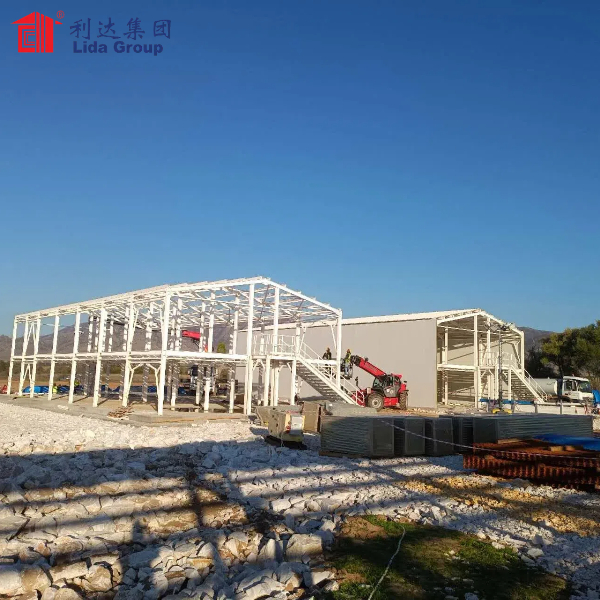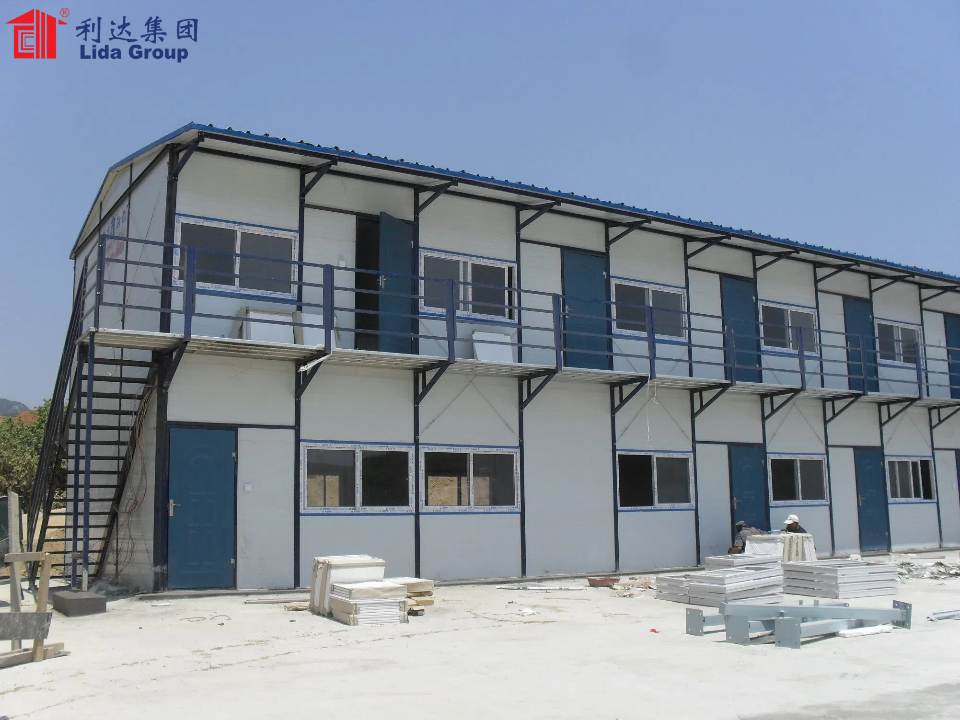In the modern era of construction and labor management, the need for efficient, affordable, and sustainable housing solutions has never been more pressing. Lida Group, a leading innovator in prefabricated building solutions, has emerged as a key player in providing high-quality prefab houses tailored specifically for workforce housing. This article explores Lida Group’s pioneering role in this field, examining its innovative approaches, benefits of prefab housing, and the impact on workforce living conditions.
The Importance of Workforce Housing
Understanding Workforce Housing
Workforce housing is designed to accommodate employees who are often engaged in temporary or seasonal work, particularly in industries such as construction, mining, agriculture, and oil and gas. These housing solutions must meet the unique needs of workers who may be located in remote areas far from their homes. Adequate housing is essential not only for the well-being of workers but also for enhancing productivity, reducing turnover, and ensuring overall job satisfaction.
Challenges in Traditional Housing Solutions
Traditional housing solutions often fall short in meeting the demands of temporary workforces. Issues such as high costs, lengthy construction timelines, and inadequate living conditions can lead to negative outcomes for both workers and employers. As industries grow and evolve, the need for innovative housing solutions becomes increasingly critical.
Lida Group: An Overview
Company Background
Founded in 1993, Lida Group has established itself as a leader in the prefabricated housing market. With a commitment to quality, efficiency, and sustainability, the company has developed a range of modular housing solutions that cater to the diverse needs of workforce housing. Lida Group’s expertise in design, engineering, and construction has positioned it as a trusted partner for companies seeking effective housing solutions.
Mission and Values
Lida Group’s mission is to provide high-quality, customizable housing solutions that enhance the living conditions of workers while promoting sustainability. The company values innovation, efficiency, and customer satisfaction, striving to meet the unique needs of each project while adhering to the highest standards of quality.
The Rise of Prefabricated Housing
What is Prefabricated Housing?
Prefabricated housing, or prefab housing, refers to structures that are manufactured off-site in a controlled environment and then transported to the construction site for assembly. This method contrasts with traditional construction, where homes are built entirely on-site. Prefab housing can be designed in various forms, including modular homes, panelized systems, and mobile homes.
Advantages of Prefabricated Housing
- Cost-Effectiveness: Prefab houses can significantly reduce construction costs due to efficient manufacturing processes, reduced labor requirements, and minimized waste.
- Speed of Construction: Prefabricated units can be assembled quickly, allowing companies to establish housing for workers in a fraction of the time required for traditional construction.
- Quality Control: Building in a factory setting allows for better quality control, ensuring that each unit meets stringent safety and quality standards.
- Sustainability: Prefab housing often utilizes sustainable materials and energy-efficient designs, reducing the overall environmental impact.
- Customization: Lida Group’s prefab solutions can be tailored to meet the specific needs of different workforces, ensuring comfort and functionality.
Lida Group’s Innovative Solutions
Modular Design Philosophy
Lida Group employs a modular design philosophy that emphasizes flexibility and scalability. Each prefab housing unit can be customized in terms of layout, size, and amenities, allowing companies to adapt their housing solutions based on workforce size and specific project requirements. This modular approach also enables easy expansion or reconfiguration as needs change.
Key Features of Lida Group’s Prefab Houses
- Flexible Layout Options: Whether a company requires single-occupancy units or multi-occupancy dormitories, Lida Group offers a variety of floor plans to accommodate different needs.
- Integrated Amenities: Lida Group’s prefab houses can come equipped with essential amenities, including bathrooms, kitchens, and communal living spaces, ensuring that workers have access to comfortable living conditions.
- Durability and Safety: Constructed from high-quality materials, Lida Group’s prefab houses are designed to withstand harsh environmental conditions, ensuring the safety and comfort of occupants.
- Energy Efficiency: Many units are designed with energy-efficient features such as insulation, energy-efficient windows, and the option for renewable energy sources, helping to reduce utility costs and environmental impact.
- Aesthetic Customization: Beyond functionality, Lida Group offers aesthetic customization options to create inviting living environments that can boost worker morale.
Enhancing Worker Living Conditions
Improving Comfort and Well-Being
Lida Group recognizes that comfortable living conditions are essential for worker well-being. The company’s prefab housing solutions are designed with several key elements that enhance comfort:
- Quality Materials: The use of high-quality construction materials ensures durability and comfort, providing a safe and pleasant living environment for workers.
- Personal Space: Many of Lida Group’s designs include private sleeping quarters, allowing workers to enjoy a sense of personal space, which is critical for mental health.
- Social Interaction: Communal areas foster social interaction among workers, helping to build a sense of community and reducing feelings of isolation.
Psychological Benefits of Quality Housing
Research indicates that comfortable living conditions can lead to improved mental health and job performance. By investing in high-quality prefab housing, companies can enhance worker satisfaction, reduce turnover, and ultimately boost productivity.
Sustainability and Environmental Responsibility
Commitment to Sustainable Practices
Lida Group is committed to sustainability in its construction practices. The company’s prefab housing solutions incorporate several eco-friendly features:
- Reduced Waste: Factory construction allows for better control over materials, resulting in significantly less waste compared to traditional building methods.
- Sustainable Materials: Lida Group prioritizes the use of environmentally friendly materials in its construction processes, minimizing the overall carbon footprint.
- Energy Efficiency: The design of Lida Group’s prefab houses often includes energy-efficient appliances and renewable energy options, contributing to lower energy consumption.
Long-Term Environmental Benefits
Investing in sustainable prefab housing not only benefits the environment but also yields long-term cost savings. Reduced energy and maintenance costs contribute to the overall financial viability of labor camps while promoting corporate social responsibility.
Case Studies: Successful Implementation of Lida Group’s Solutions
Mining Industry
In a remote mining operation, a company faced significant challenges in providing adequate housing for its workforce. Traditional construction methods were not feasible due to logistical issues and harsh weather conditions. Lida Group was brought in to provide customizable prefab housing solutions.
The rapid deployment of modular units allowed the mining company to establish comfortable living quarters for its workers. The prefabricated design ensured durability, and the inclusion of communal spaces improved worker morale and productivity.
Construction Projects
A large construction firm on a major infrastructure project faced delays in providing adequate housing for workers. By utilizing Lida Group’s prefab solutions, the firm was able to set up a labor camp within weeks. The customizable options allowed for the integration of kitchens, dining areas, and recreation spaces, significantly enhancing the living conditions for workers.
Agricultural Labor Camps
In the agricultural sector, a cooperative needed to provide temporary housing for seasonal workers. Lida Group’s prefab houses were deployed, allowing the cooperative to quickly establish housing that could be easily expanded or relocated as needed. The positive impact on worker satisfaction led to increased productivity during peak harvest times.
Challenges and Considerations
Initial Investment
While prefabricated housing offers long-term savings, the initial investment can be a barrier for some companies. However, it is essential to consider the total cost of ownership, including maintenance and energy savings, which often makes prefab housing a financially sound choice.
Regulatory Compliance
Navigating local building codes and regulations can pose challenges when implementing prefab housing solutions. Lida Group works closely with local authorities to ensure that all units meet necessary compliance standards, facilitating a smoother deployment process.
Cultural Sensitivity
In regions with diverse cultural backgrounds, it is crucial to consider the needs and preferences of the workforce when designing housing solutions. Lida Group’s flexible designs allow for adaptations that respect local customs and practices, ensuring that living spaces are suitable for all workers.
The Future of Prefabricated Housing Solutions
As the demand for efficient and sustainable housing solutions continues to grow, Lida Group is well-positioned to lead the charge in the prefabricated housing market. Innovations in construction technology and materials will further enhance the appeal of prefab solutions.
Technological Innovations
The integration of smart technology into prefab housing is an emerging trend. Features such as intelligent climate control, energy management systems, and advanced security measures can improve the living experience for workers while promoting sustainability.
Global Demand
As companies worldwide seek to improve living conditions for transient workers, the global demand for prefabricated housing solutions is expected to rise. Lida Group’s commitment to designing comfortable, functional, and sustainable housing will make it a preferred partner for organizations looking to enhance their labor camps.
Conclusion
Lida Group’s pioneering efforts in prefabricated housing solutions have redefined the standards for workforce accommodation. By prioritizing customization, comfort, and sustainability, the company has positioned itself as a leader in addressing the unique challenges faced by labor camps. As industries continue to evolve, the advantages of prefabricated housing will become increasingly evident, paving the way for a future where affordable and comfortable living is accessible to all workers. Embracing Lida Group’s innovative solutions is not just a strategic business decision; it is a commitment to enhancing the quality of life for workers and promoting a more sustainable future in labor management.
Contact Us
Post time: Dec-18-2024


